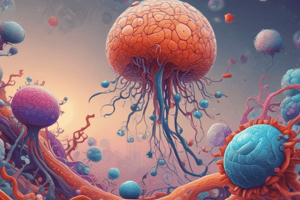Podcast
Questions and Answers
What is the most widely accepted system of classification in biology?
What is the most widely accepted system of classification in biology?
Which domains are included in the Linnaean system of classification?
Which domains are included in the Linnaean system of classification?
What is the foundation of our understanding of evolution?
What is the foundation of our understanding of evolution?
What molecule encodes genetic information in living organisms?
What molecule encodes genetic information in living organisms?
Signup and view all the answers
What key concept within ecology offers insights into life's interconnected web?
What key concept within ecology offers insights into life's interconnected web?
Signup and view all the answers
Which field applies biological discoveries to develop new technologies like genetic engineering?
Which field applies biological discoveries to develop new technologies like genetic engineering?
Signup and view all the answers
What are the building blocks of life in biology?
What are the building blocks of life in biology?
Signup and view all the answers
Which discipline plays a pivotal role in our quest to know the living world?
Which discipline plays a pivotal role in our quest to know the living world?
Signup and view all the answers
What is the smallest unit of life that can replicate independently?
What is the smallest unit of life that can replicate independently?
Signup and view all the answers
What are the two main categories into which cells are classified based on their structure?
What are the two main categories into which cells are classified based on their structure?
Signup and view all the answers
Which cellular process allows cells to replicate themselves and maintain life?
Which cellular process allows cells to replicate themselves and maintain life?
Signup and view all the answers
What is the sequence of events that leads to cell division called?
What is the sequence of events that leads to cell division called?
Signup and view all the answers
Study Notes
Science: Discovering the World through Biology
Science is a vast and interconnected field, encompassing various disciplines designed to help us understand and interact with our world more effectively. Among these disciplines, biology plays a pivotal role in our quest to know the living world. Let's dive into the fascinating realm of biology and explore some of its key concepts and contributions to our understanding of life.
Life's Building Blocks: Chemistry and Molecules
Biology rests on a foundation built by chemistry, for it's the chemical interactions and reactions that fuel life's processes. The building blocks of life are molecules like carbohydrates, lipids, proteins, and nucleic acids. These molecules combine in myriad ways to form the cells and organisms we know.
Cellular Landscape: The Basis of Life
At the heart of biology lies the cell, the smallest unit of life that can replicate independently. Cells are categorized as prokaryotic or eukaryotic, dividing them based on the presence or absence of a nuclear membrane and other organelles.
Cellular processes, such as the cell cycle, cell division, and homeostasis, are fundamental to understanding life. For instance, cell division, or mitosis, allows cells to replicate themselves and maintain life. The cell cycle is a sequence of events that leads to cell division, taking place in four key phases: G1, S, G2, and M.
Hierarchy of Life: Organisms and Classification
Biology classifies organisms into various taxonomic groups. Organisms are categorized based on shared characteristics, such as structure, function, and genetics. The Linnaean taxonomy system, developed by Carl Linnaeus, is the most widely accepted system of classification.
Under the Linnaean system, organisms are grouped into domains, kingdoms, phyla, classes, orders, families, genera, and species. Some of the most prominent domains are Archaea, Bacteria, and Eukarya. Each of these domains is further divided into kingdoms, containing phyla, classes, orders, families, genera, and species.
Evolution: The Story of Life
Through evolution, species change over time as they adapt to their environment, leading to the emergence of new species. Charles Darwin's theory of natural selection is the foundation of our understanding of evolution. According to Darwin, species evolve by natural selection, a process that favors individuals with advantageous traits, leading to the passing of those traits to future generations.
Ecology: Life's Interconnected Web
Ecology is the study of the relationships between organisms and their environment. It addresses questions about how organisms interact with each other and their surroundings. Ecological niches, trophic levels, and ecosystems are key concepts within ecology, offering insights into life's interconnected web.
Genetics: The Code of Life
Genetics explores how heritable traits are passed down from one generation to the next. Deoxyribonucleic acid (DNA) is the molecule that encodes genetic information in living organisms. The central dogma of molecular biology describes the flow of genetic information from DNA to RNA to proteins.
Application of Biology
Biology isn't just about understanding the world; it's also about using that understanding to solve problems and improve life. For instance, biotechnology applies biological discoveries to develop new technologies and applications, such as genetic engineering, recombinant DNA, and gene editing.
Biology also fuels medicine, with many medical advancements driven by discoveries in biology and genetics. The development of vaccines, targeted treatments, and personalized medicine are just a few examples of how biology shapes our health and well-being.
In conclusion, biology provides the foundation for our understanding of life and the living world, offering insights into the interconnectedness of organisms and their environments. It opens doors to new discoveries and technologies, shaping our future and improving our lives.
Studying That Suits You
Use AI to generate personalized quizzes and flashcards to suit your learning preferences.
Description
Delve into the fascinating realm of biology and discover its essential concepts and contributions to our understanding of life. Explore topics like life's building blocks, cellular landscape, hierarchy of life, evolution, ecology, genetics, and applications of biology.




